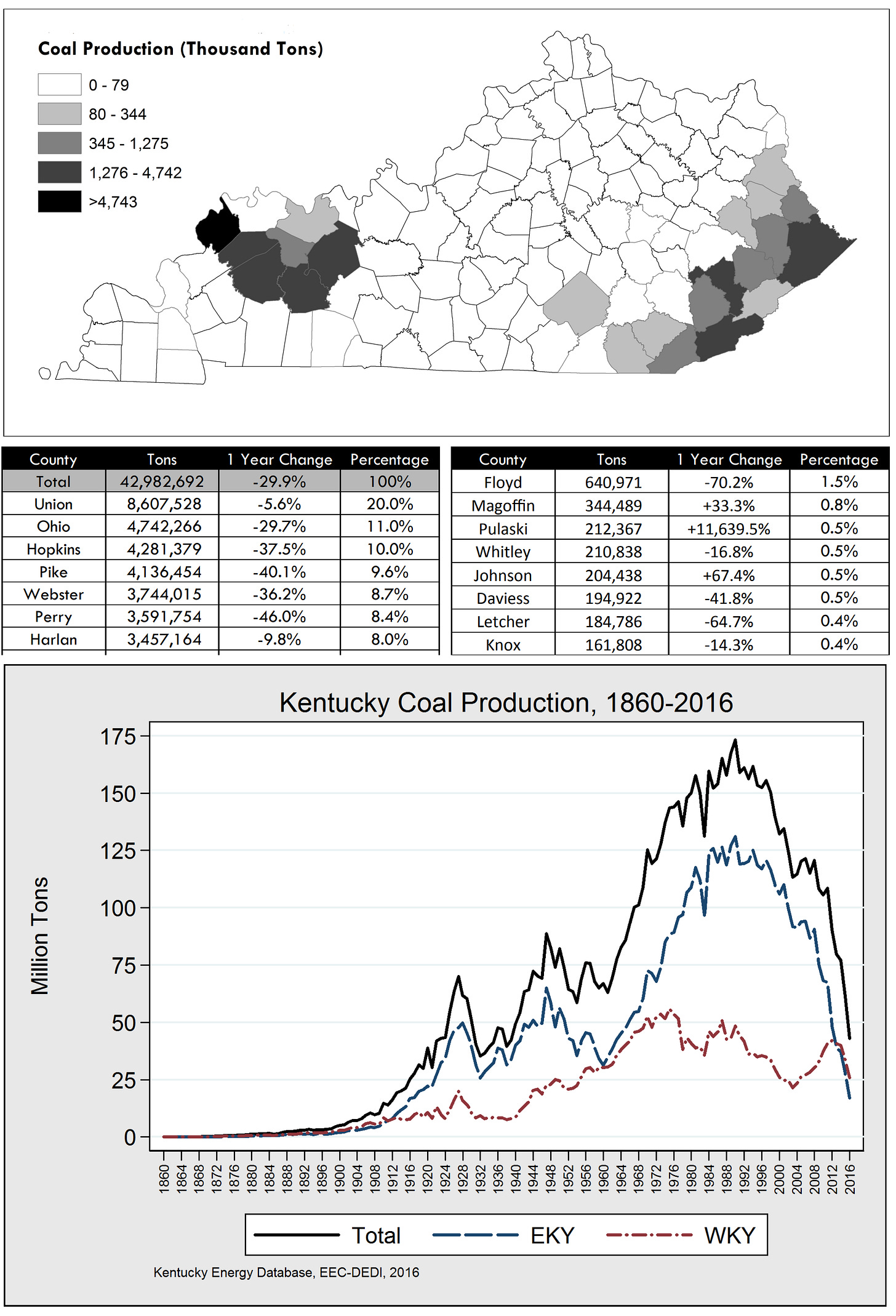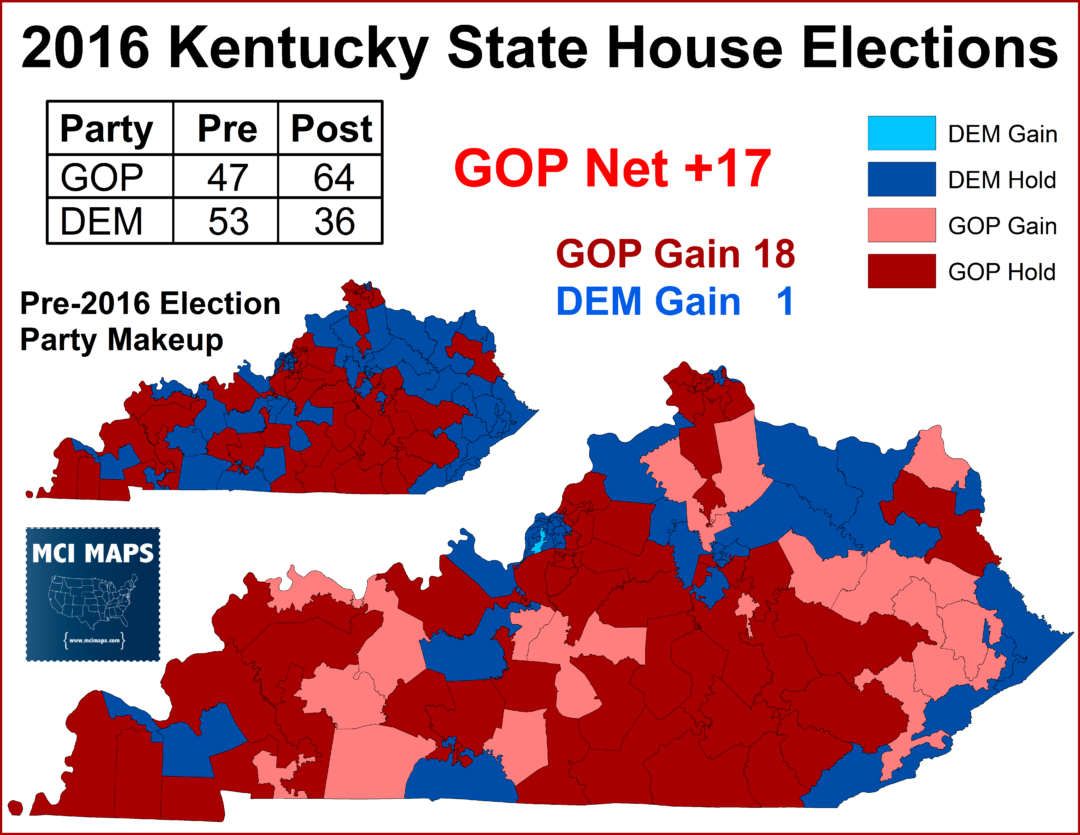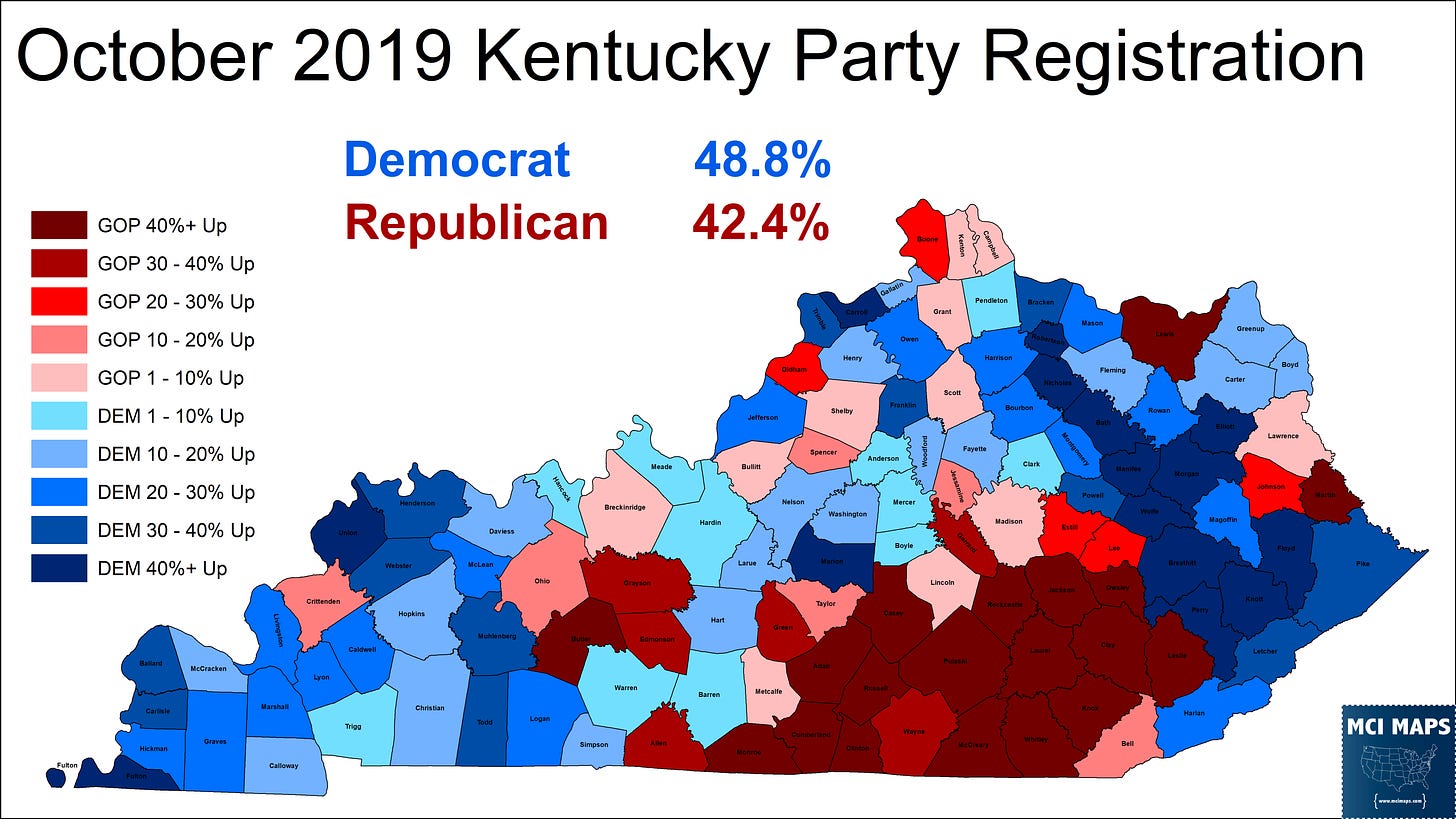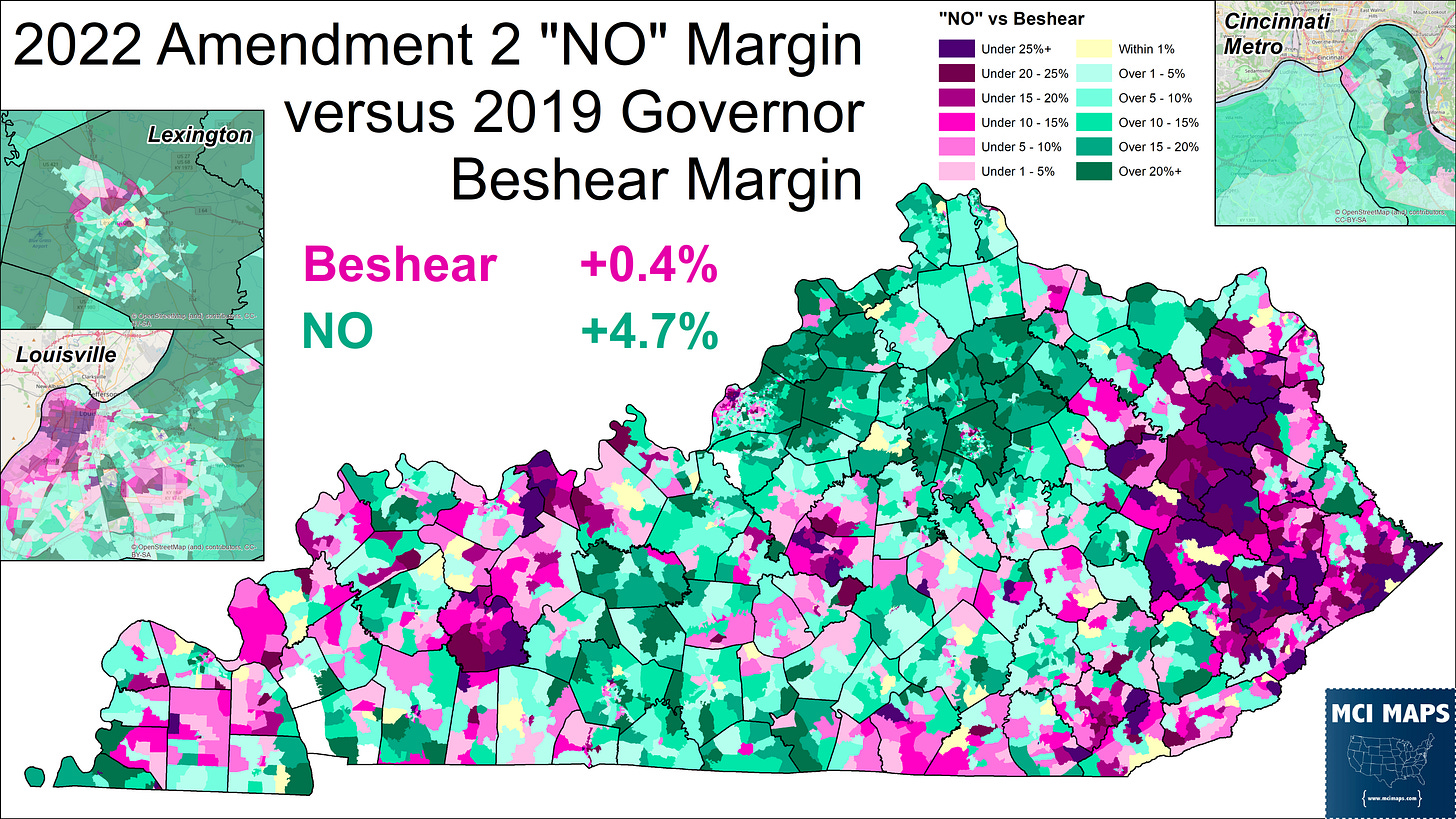Today, several elections are taking place across the country.
Voters in Virginia will be electing a state legislature
Voters in Pennsylvania will be electing a Supreme Court Justice
Mississippi will hold its Gubernatorial and other state races
Ballot measures will be voted on across the country
A litany of important local races, more on those can be found here
And voters will go to the polls for Governor in Kentucky
For this newsletter, I want to focus in on Kentucky; a state that voted for Donald Trump by 26 points and yet has a Democratic Governor - Andy Beshear.
The State of Play in Kentucky
Like much of the American South and Appalachia, Kentucky is a state that once leaned Democratic but has trended Republican with time. Through the mid 2000s, Kentucky has only elected a handful of Republican Governors. However, by the Bush years, the Senate seats were in GOP hands, as were most of the congressional seats. Bill Clinton secured a very narrow win in 1996, but underperforming his national margin. By 2000, and onward, the state is a SAFE GOP.
One of the issues leading to shrinking Democratic margins is the decline of coal in the state. Production continues to fall in East Kentucky, largely due to national and international factors.
This decline has led to scapegoating of the environmental movement, and a backlash against the national Democratic party. Until recent years, several coal counties were steadfast Democratic, backing Democrats like Mondale or Dukakis, that otherwise lost big nationwide. These days many of those counties have become deep red for the top of the ticket. Combine this with continued rural swings to Republicans (coal presence of not), and Kentucky has seen a notable Republican swing.
I’ve been writing about Kentucky for several years. Articles include, but not limited to…
The results of the 2016 Presidential primary and looking at protest votes from conservative democrats
A look at several key special state house elections from 2020
A look at a major GOP gain in a coal country state senate seat
While the state has trended Republican, there still have been many non-federal Democratic victories. From 2007 to 2015, Governor Steve Beshear was Governor, and a popular one at that. In 2011, Beshear won re-election by 20 points, winning a vast majority of the counties. However, in 2015, Republican businessman Matt Bevin secured a surprise win over the Democratic Attorney General; Jack Conway.
The Bevin win was shocking to many because Bevin, a Tea Party figure that had unsuccessful primaried Mitch McConnell in 2014, was not liked by the GOP establishment; which did little to help him when he won the nomination. The limited polling had Beshear up 3 points, but notably only around 43%. Clearly most undecideds broke to Bevin, allowing him to secure the win. This result reflecting the GOP gains in the state.
The result was so shocking that a contingent of left-wing activists on old forums tried to claim that the result was rigged (citing that a few Democratic cabinet members had won). The claims were so ridiculous I actually did an entire article debunking them, which delves more into 2015’s races. Read here. Note - I think my maps suck there. Also note how you won’t find a single elected official justifying these internet claims, unlike a certain other party leader……
Bevin proved to be an unpopular Governor, with a brash personality and plenty of clashes with the legislature. The GOP has controlled the state senate since the 1990s, but the house remained narrowly Democratic. However, in 2016, the same day Donald Trump easily took the state Kentucky’s house flipped to the GOP with a crushing 17 net gains.
Trendlines through the rest of the decade would confirm the GOP gains in the state. However, Bevin remained personally unpopular. Not only was his conservativism at times unpopular, especially around education and teacher pay, but his brash personality led to backlash. A notable example was when a winter storm led to freezing temperatures (wind chill of -10 to -20) and Bevin complained about school closures - saying kids were getting too soft. The national attention led to AL ROKER of all people, to chastise the Governor, calling him a “nitwit.”
In 2019, Bevin, who had a job approval in the low 30s, was up for re-election. Democrats had a real shot against the Governor. A contested primary saw Attorney General Andy Beshear, the son of the former Governor, win the nomination. Beshear bested State Rep Rock Atkins, who was very strong in the eastern coal fields.
After the primary, Beshear secured Atkin’s support. The general election was set to pit the unpopularity of Bevin with the the state’s increasing GOP dominance. In the end, Beshear secured a narrow victory, winning by just over 5,000 votes.
The results were all the more impressive considering that Beshear was the only statewide Democrat to win that cycle. Every other contest saw the GOP win, with them flipping the offices of Attorney General and Secretary of State. Back in 2011, only Agriculture Commissioner was in GOP hands.
Beshear is the last Democrat to win statewide in Kentucky.
Now, in 2023, his Republican opponent is Daniel Cameron, his attorney general. It is, in fact, a repeat of the dynamic from 2019. Beshear, unlike Bevin however, maintains a strong job approval, often in the high 50s or low 60s. Cameron, meanwhile, has lagged Beshear in cash spent.
However, while all the dynamics of the race should point to a Beshear re-election, there is the constant wind of the GOP ascendancy in the state. This is seen up and down ballot.
Shifting Down-Ballot Partisanship
While Kentucky has remained fairly static as a GOP-strong state for federal races, its partisan shifts have been showing up down-ballot as well. In my 2023 Halloween articles, I focused on the coroner elections in Kentucky (every county elects them). The results showed how over 20 offices flip from Democratic to Republican. Similar stories played out for county commissions, county attorneys, sheriffs, and so on. Down-ballot tends to be the last of offices to re-align to the top of the ticket, and that has continued in Kentucky
Go here to read about the statewide coroner elections
The down-ballot shifts are also visible in voter registration. When Beshear won in 2019, the state still had a Democratic voter registration advantage.
Now, many of these democrats were very much hardened conservatives that had long abandoned the national, or even state, party. This can be seen in a map comparing the share of the vote Beshear got vs the Democratic share of registration. The orange counties show Beshear getting a lower % than the Democratic voter reg.
Heading into the 2023 Governor election, Kentucky is now Republican leading in registration.
Almost every county saw the GOP improve relative to Democrats, with the Lexington area being the lone major exception.
The registration shifts confirm an increasing acceptance by the voters to split their tickets less and less and just become steadfast Republicans.
We have seen this with a continued shrinking of the Democratic caucus in the legislature. The current state house is 80 Republicans to 20 Democrats; almost all of whom are based out of urban centers. Their are only a few rural democratic state representatives left.
Democratic fortunes in Kentucky are rapidly shrinking. So how can Beshear hope to win?
Abortion Politics in Kentucky
In a statement that I NEVER would have imagined typing just a few years earlier, the Democratic Governor Kentucky is counting on abortion to secure his re-election. That is true, and it makes ALOT of sense.
Abortion politics has been turned on its head after the Supreme Court’s repeal of Roe v Wade. Horror stories of rape victims being unable to end the pregnancy, or people who’s pregnancy develops medical complications and being unable to terminate, have flooded news stories. Even outside of horror stories, many voters have come to resent the taking away of what has been regarded as a right for decades. Even though Kentucky is culturally conservative and would likely be fine with a 15 week ban or other restrictions, the state currently has much tougher laws. When Roe was over-turned, a trigger law passed in Kentucky years earlier banned the procedure except for when the women’s life is at risk. This is a severe limitation.
Beshear has sought to tie Cameron to this controversial ban, running ads of tragic stories. This add highlights a couple who had to end a pregnancy due to non-viability, something not exempted in the law.
And easily the most chilling ad of the 2023 election cycle - we hear from a young woman who was raped by her step-father at 12. The ad highlights the complete absence of rape and incest exemption in current Kentucky law.
The ads have infuriated the Cameron campaign, who have tried to moderate themselves on abortion - saying they would sign a law that expanded exemptions. Beshear has put Cameron is a tough spot, as him being too aggressive in allowing exemptions could cost him hardcore pro-life voters, while saying nothing opens him up to further weakness in the suburbs and cities.
There is data to back up the Beshear focus on abortion. As I wrote about several moths back, Kentucky rejected a pro-life measure back in 2022.
I delve much more into the details of this campaign in this substack post. Long and short was, Kentucky voted to reject a measure that said the state’s privacy rights do NOT extend to abortion. Despite being such a deep-red state, Kentucky voters rejected this, with the cities, suburbs, and exurbs roundly rejecting the amendment. While the rural communities largely backed the measure, many did not do so with the same landslides they give to Republicans.
The coalition that rejected the pro-life amendment has some overlap with Beshear's 2019 victory, but does include some differences. Many pro-choice precincts backed Bevin, many pro-life areas backed Beshear. Below is the map showing the difference between Beshear margin from 2019 and the “NO” (pro-choice) margin from 2022.
Beshear’s coalition includes many pro-life voters. However, he also clearly has room to grow in the suburbs and exurbs. Considering the right-wing moves happening in the pro-life, eastern coal counties regions, its easy to see Beshear is willing to gamble on gains in suburbia. It is very likely that even if Beshear took a firm anti-abortion stance, he’d lose ground in the ancestral rural communities.
Final Thoughts
The one major frustration about the Kentucky Governor race is that the state often lacks polling. The state is hard to poll when it comes to access to a good sample of voters, and hence we are not seeing the big national pollsters delve into the state. Polling in 2015 missed, albeit those had large undecideds. 2019 showed wild margins but NBC (which has not polled in 2023) did have a tie.
Polls for 2023 show Beshear with a narrow lead on average, but well within the margin of error. Consensus from consultants is that while Beshear started with a larger lead (though undecideds leaned Republican) - there has been a notable tightening. The good for Beshear is that is polls close to 50%, way better than 2015 Conway’s 43% average. Beshear and his allies have outspent Cameron, around $45 million to $26 million, though that is likely not including late ad buys.
Most believe Beshear gets a narrow victory; however a Cameron win is not out of the equation at all. One thing that does stand out to me is that this race very much reminds me of Louisiana Governor in 2019. That year, Democrat John Bel Edwards narrowly secured re-election is an increasingly red state. This year, with him termed out, the office easily went to the GOP in October. I feel Beshear is in a very similar vote. As I said to someone over the weekend…..
"If Andy Beshear loses, he will be the last Democratic Governor of Kentucky for a long time. And if Andy Beshear wins, he will still be the LAST Democratic Governor of Kentucky for a long time."














